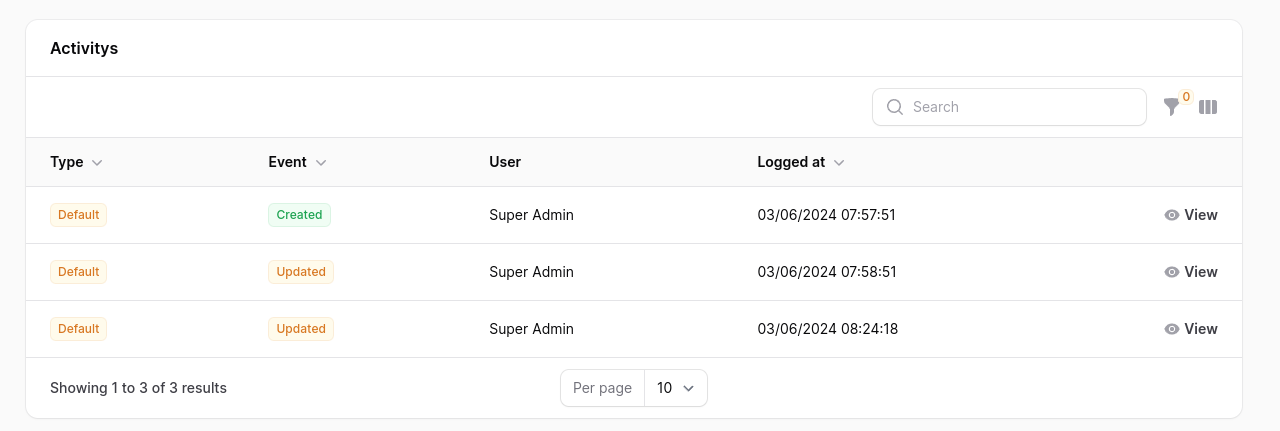This package provides a Filament resource that shows you all of the activity logs and detailed view of each log created using the spatie/laravel-activitylog package. It also provides a relationship manager for related models.
- Laravel v11
- Filament v3
- Spatie/Laravel-activitylog v4
ActivityLog Plugin is translated for :
- 🇧🇷 Brazilian Portuguese
- 🇺🇸 English
- 🇪🇸 Spanish
- 🇫🇷 French
You can install the package via composer:
composer require rmsramos/activitylogAfter that run the install command:
php artisan activitylog:installThis will publish the config & migrations from spatie/laravel-activitylog
And run migrates
php artisan migrateYou can manually publish the configuration file with:
php artisan vendor:publish --tag="activitylog-config"This is the contents of the published config file:
return [
'resources' => [
'label' => 'Activity Log',
'plural_label' => 'Activity Logs',
'navigation_group' => null,
'navigation_icon' => 'heroicon-o-shield-check',
'navigation_sort' => null,
'navigation_count_badge' => false,
'resource' => \Rmsramos\Activitylog\Resources\ActivitylogResource::class,
],
'datetime_format' => 'd/m/Y H:i:s',
];Optionally, you can publish the views using
php artisan vendor:publish --tag="activitylog-views"In you Model add Spatie\Activitylog\Traits\LogsActivity trait, and configure getActivitylogOption function
For more configuration, Please review Spatie Docs
use Illuminate\Database\Eloquent\Model;
use Spatie\Activitylog\Traits\LogsActivity;
use Spatie\Activitylog\LogOptions;
class NewsItem extends Model
{
use LogsActivity;
protected $fillable = ['name', 'text'];
public function getActivitylogOptions(): LogOptions
{
return LogOptions::defaults()
->logOnly(['name', 'text']);
}
}In your Panel ServiceProvider (App\Providers\Filament) active the plugin
Add the Rmsramos\Activitylog\ActivitylogPlugin to your panel config
use Rmsramos\Activitylog\ActivitylogPlugin;
public function panel(Panel $panel): Panel
{
return $panel
->plugins([
ActivitylogPlugin::make(),
]);
}You can swap out the ActivitylogResource used by updating the ->resource() value. Use this to create your own CustomResource class and extend the original at \Rmsramos\Activitylog\Resources\ActivitylogResource::class. This will allow you to customise everything such as the views, table, form and permissions.
Note
If you wish to change the resource on List and View page be sure to replace the getPages method on the new resource and create your own version of the ListPage and ViewPage classes to reference the custom CustomResource.
use Rmsramos\Activitylog\ActivitylogPlugin;
public function panel(Panel $panel): Panel
{
return $panel
->plugins([
ActivitylogPlugin::make()
->resource(\Path\For\Your\CustomResource::class),
]);
}You can swap out the Resource label used by updating the ->label() and ->pluralLabel() value.
use Rmsramos\Activitylog\ActivitylogPlugin;
public function panel(Panel $panel): Panel
{
return $panel
->plugins([
ActivitylogPlugin::make()
->label('Log')
->pluralLabel('Logs'),
]);
}You can add a Resource navigation group updating the ->navigationGroup() value.
use Rmsramos\Activitylog\ActivitylogPlugin;
public function panel(Panel $panel): Panel
{
return $panel
->plugins([
ActivitylogPlugin::make()
->navigationGroup('Activity Log'),
]);
}You can swap out the Resource navigation icon used by updating the ->navigationIcon() value.
use Rmsramos\Activitylog\ActivitylogPlugin;
public function panel(Panel $panel): Panel
{
return $panel
->plugins([
ActivitylogPlugin::make()
->navigationIcon('heroicon-o-shield-check'),
]);
}You can active Count Badge updating the ->navigationCountBadge() value.
use Rmsramos\Activitylog\ActivitylogPlugin;
public function panel(Panel $panel): Panel
{
return $panel
->plugins([
ActivitylogPlugin::make()
->navigationCountBadge(true),
]);
}You can set the Resource navigation sort used by updating the ->navigationSort() value.
use Rmsramos\Activitylog\ActivitylogPlugin;
public function panel(Panel $panel): Panel
{
return $panel
->plugins([
ActivitylogPlugin::make()
->navigationSort(3),
]);
}If you would like to prevent certain users from accessing the logs resource, you should add a authorize callback in the ActivitylogPlugin chain.
use Rmsramos\Activitylog\ActivitylogPlugin;
public function panel(Panel $panel): Panel
{
return $panel
->plugins([
ActivitylogPlugin::make()
->authorize(
fn () => auth()->user()->id === 1
),
]);
}To ensure ActivitylogResource access via RolePolicy you would need to add the following to your AppServiceProvider:
use App\Policies\ActivityPolicy;
use Illuminate\Support\Facades\Gate;
use Spatie\Activitylog\Models\Activity;
class AppServiceProvider extends ServiceProvider
{
public function boot(): void
{
Gate::policy(Activity::class, ActivityPolicy::class);
}
}use Rmsramos\Activitylog\ActivitylogPlugin;
public function panel(Panel $panel): Panel
{
return $panel
->plugins([
ActivitylogPlugin::make()
->resource(\Path\For\Your\CustomResource::class)
->label('Log')
->pluralLabel('Logs')
->navigationGroup('Activity Log')
->navigationIcon('heroicon-o-shield-check')
->navigationCountBadge(true)
->navigationSort(2)
->authorize(
fn () => auth()->user()->id === 1
),
]);
}If you have a model that uses the Spatie\Activitylog\Traits\LogsActivity trait, you can add the Rmsramos\Activitylog\RelationManagers\ActivitylogRelationManager relationship manager to your Filament resource to display all of the activity logs that are performed on your model.

use Rmsramos\Activitylog\RelationManagers\ActivitylogRelationManager;
public static function getRelations(): array
{
return [
ActivitylogRelationManager::class,
];
}To make viewing activity logs easier, you can use a custom action. In your UserResource in the table function, add the ActivityLogTimelineAction.
use Rmsramos\Activitylog\Actions\ActivityLogTimelineAction;
public static function table(Table $table): Table
{
return $table
->actions([
ActivityLogTimelineAction::make('Activities'),
]);
}you can pass a matrix with the relationships, remember to configure your Models.
public static function table(Table $table): Table
{
return $table
->actions([
ActivityLogTimelineAction::make('Activities')
->withRelations(['profile', 'address']), //opcional
]);
}You can configure the icons and colors, by default the 'heroicon-m-check' icon and the 'primary' color are used.
use Rmsramos\Activitylog\Actions\ActivityLogTimelineAction;
public static function table(Table $table): Table
{
return $table
->actions([
ActivityLogTimelineAction::make('Activities')
->timelineIcons([
'created' => 'heroicon-m-check-badge',
'updated' => 'heroicon-m-pencil-square',
])
->timelineIconColors([
'created' => 'info',
'updated' => 'warning',
])
]);
}You can limit the number of results in the query by passing a limit, by default the last 10 records are returned.
use Rmsramos\Activitylog\Actions\ActivityLogTimelineAction;
public static function table(Table $table): Table
{
return $table
->actions([
ActivityLogTimelineAction::make('Activities')
->limit(30),
]);
}use Rmsramos\Activitylog\Actions\ActivityLogTimelineAction;
public static function table(Table $table): Table
{
return $table
->actions([
ActivityLogTimelineAction::make('Activities')
->withRelations(['profile', 'address'])
->timelineIcons([
'created' => 'heroicon-m-check-badge',
'updated' => 'heroicon-m-pencil-square',
])
->timelineIconColors([
'created' => 'info',
'updated' => 'warning',
])
->limit(10),
]);
}Please see CHANGELOG for more information on what has changed recently.
Please see CONTRIBUTING for details.
Please review our security policy on how to report security vulnerabilities.
Special acknowledgment goes to these remarkable tools and people (developers), the Activity Log plugin only exists due to the inspiration and at some point the use of these people's codes.
The MIT License (MIT). Please see License File for more information.






